Transnational Italian Studies within Transnational Modern Languages: A Book and Handbook Presentation
A panel of presenters Charles Burdett (University of Durham, UK) Loredana Polezzi (Stony Brook University), Derek Duncan (St. Andrews University, UK) and Jennifer Burns (University of Warwick, UK), moderated by Teresa Fiore (Inserra Chair, MSU)
Q&A includes Giulia Riccò (University of Michigan) and Serena Bassi (Yale University) of the Transnational Italian Studies Research Network (MLA)
Sunday Oct. 4, 2020 TIME: 3pm EST
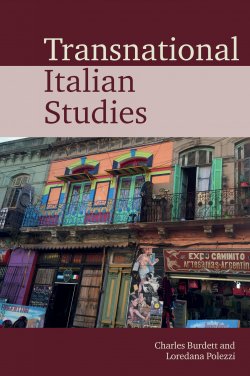
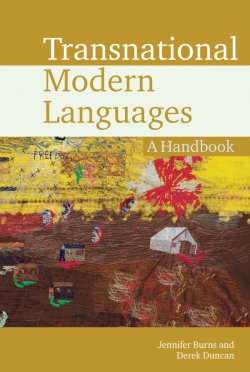
Addressing national culture as the result of forms of mobility is an intrinsic part of teaching endeavors, especially for nations with a long colonial history such as France or Spain. Yet, only a structured transnational approach can simultaneously embrace the complex workings of migration, imperialism, commercial trade, and exchanges of ideas that have shaped nations in contact with and under the influence of other nations. This transnational model is not focused on the inquiry into separate national traditions, but the study of languages, cultures and their interactions within a whole new vision for Modern and World Languages in the 21st century.
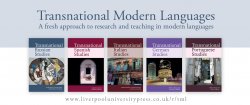
Italy, a crossroad of cultures with a layered history of conquest, diaspora, colonialism, immigration, and regionalism linked to foreign powers, is an ideal lab for this innovative take as it shows how a transnational/transcultural perspective stretching from the medieval period to the present and an understanding of linguistic and cultural translation underlies all approaches to the study of Italian culture in a global context.
Consequently, it is not surprising that a group of Italianists led a multi-year research project on trans-national studies that used “Transnational Italies” as the launching pad for a trailblazing initiative including a series of publications by Liverpool University Press as well as traveling exhibits, international symposia, and community service interventions supported by a government grant in the UK.
As an Italian Program that through the support of the Inserra Endowment has for a decade given center stage to curricular and extra-curricular activities focused on “transnational Italies” – from courses to events, internships, and student competitions on migrations, colonialism, translation and international business – we are extremely pleased to host an online conversation with the leading scholars of this project. The presentations illustrate the specific texts in Transnational Italian Studies and the Handbook for Transnational Modern Languages and encourage a debate involving students, teachers at all levels from elementary to university, as well as the broader community. Ultimately, the event uses “Transnational Italies” as an example applicable to all other languages taught on campus that the series covers (French, Spanish, Russian, Portuguese, German) to propose an innovative way of teaching, learning and circulating languages and cultures today.
The conversation will be tailored around the specific learning environment of MSU as well as the new challenges designed in the COVID era. The audience is invited to share questions and comments on the following topics by writing to fiorete@montclair.edu by Oct. 3rd:
– Using a transnational model at a Hispanic-serving institution where students’ lives are experientially transnational (specific references will be made to the course Italian for Spanish speakers): How can we move from the concept of a minority with needs to a vision that gives center stage to pluri-cultural subjects?
– Adopting concrete steps towards a transnational curriculum: How can languages be the fulcrum and not the appendix of this approach? What are the possible challenges posed by the pandemic for institutions emphasizing transnationalism?
– Rethinking the student-teacher relationship based on a translational modality where access to learning transcends traditional roles: who knows what and to what extent in a pluri-language class?
Bios

Charles Burdett is a Professor of Italian Studies and Director of Studies in the School of Modern Languages and Cultures at the University of Durham, UK. His principal areas of research are literary culture under Fascism; travel writing; the Italian colonial presence in Libya and East Africa and its legacy; theories of inter-cultural and transnational contact; the representation of Islam and the Islamic world in recent Italian literature and culture.
An important part of his work concerns the theoretical frame through which we consider transnational contact and the implications for the disciplinary field of Modern Languages of the study of cultural translation in all its forms. This research interest lies at the heart of the AHRC beacon project of which he is Principal Investigator, Transnationalizing Modern Languages: Mobility, Identity and Translation in Modern Italian Cultures, followed by the project Transnationalizing Modern Languages: Global Challenges (2016-17) based in Namibia, and TML: Exhibitions for Impact (2017) which brings key outputs of the project to New York, Melbourne and Addis Ababa. Among his publications, which include several articles on Fascism, the Italian Empire, and Italian travel writing about the Middle East, Spain, Germany, Russia and the United States, see the books Italy, Islam and the Islamic World: Representations and Reflections from 9/11 to the Arab Uprisings (2016), Journeys through Fascism (2007) and the co-edited volume Transnational Italian Studies with Loredana Polezzi. He is currently working on a monographic study, “The Representation of the Italian Empire and its Afterlife: Utopia, Time, and Memory” and developing a collaborative project on the temporality of the Islamic presence in modern Italy.
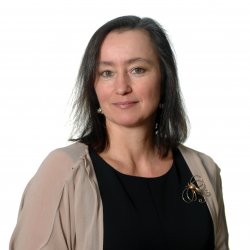
Loredana Polezzi is Alfonse M. D’Amato Chair in Italian American and Italian Studies in the Department of European Languages, Literatures and Cultures at Stony Brook University (USA). She previously held positions in Italian and in translation studies at the Universities of Warwick and Cardiff, in the UK. Her research interests combine translation studies and transnational Italian studies. She has written extensively on Italian travel writing, colonial and postcolonial literature, translingualism and migration.
Her current work focuses on memory, mobility and translation in transatlantic Italian cultures. She has specialist interests in Italian American studies and in translation and the visual arts. With Rita Wilson, she is co-editor of leading international journal The Translator and she is the current President of the International Association for Translation and Intercultural Studies (IATIS). She was a co-investigator in the research projects ‘Transnationalizing Modern Languages’ and ‘Transnationalizing Modern Languages: Global Challenges’, funded by the UK’s Arts and Humanities Research Council under the ‘Translating Cultures’ theme and Global Challenges Research Fund. She is one of the editors of the ‘Transnational Modern Languages’ book series, published by Liverpool University Press, and the co-editor of Transnational Italian Studies volume with Charles Burdett.
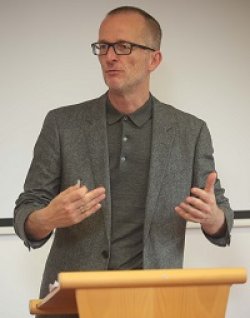
Derek Duncan is Professor of Italian at the School of Modern Languages, University of St. Andrews, UK. His research focuses on modern Italian culture with a particular interest in exploring intersections of sexuality/gender and of race/ethnicity in a transnational framework. He engages Italian cultural production as a set of vernacular global practices extending far beyond the peninsula itself and teaches courses that embrace Black Italians and Italian Emigration.
He is currently working on a two-year Leverhulme-funded project, Loose Ends: Minor transnational Italian cultures. Loose Ends looks at four cities – Edinburgh, Hamburg, Adelaide, New Orleans – which have relatively small, but significant, populations of people of Italian descent that offer opportunities for thinking about migration without inevitably referring back to a fixed point of origin. Italy is not at the centre of this minor transnational culture. While most research on the subject of migration looks at the relationship between where people come from and where they move to, his project explores alternative and less familiar forms of cultural connectedness often including cultural projects in different languages. He is the co-organizer of Press Play, an integrated conference and exhibition about the link between artistic practice and academic research held in Rome in 2019. He is one of the editors of two new book series with Liverpool University Press (Transnational Italian Cultures and Transnational Modern Languages) and co-editor of Transnational Modern Languages: A Handbook.
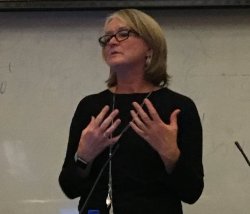
Jennifer Burns is Professor of Italian at the School of Modern Languages and Cultures, University of Warwick, UK. She completed her DPhil in Italian at Oxford University (1987-1991), after some time spent working for RAI (the Italian public broadcaster) in London. Her research agenda focuses on identity, memory, home, political commitment place and space, and literature applied to travel as well as migrant narratives.
Among her publications: Fragments of impegno: Interpretations of Commitment in Contemporary Italian Narrative from 1980 to 2000, Migrant Imaginaries: Figures in Italian Migration Literature (2013) and Borderlines: Migrant Writing and Italian Identities from 1870 to 2000 (2003) co-edited with Loredana Polezzi. In addition to pursuing individual research in this area, Burns secured funding from the AHRC (under the ‘Diasporas, Migration and Identities’ theme) with colleagues across the UK to develop a model in which languages are viewed most productively in terms of translation and multilingualism, and nations in terms of transnational identities. She is the co-editor of Transnational Modern Languages: A Handbook with Derek Duncan. A separate strand of Burns’s research, developing since 2010, has been an investigation into the literary cultures of northern Italy in the late nineteenth century which resulted in the co-edited publication with Gabriella Romani, The Formation of a National Audience in Italy, 1750-1890: Readers and Spectators of Italian Culture (2017).
- Sponsored and organized by the Inserra Chair in Italian and Italian American Studies, in collaboration with the Italian Program (Dept. of World Languages and Cultures) and the Transnational Italian Studies Research Network at the Modern Language Association.
- Photo credit: Transnationalizing Modern Languages project website
- Short link: tinyurl.com/TISatMSU
FURTHER RESOURCES
Videorcording of this Oct. 4 event: Video on Inserra YouTube Channel
The series: Transnational Modern Languages Series
The book: Transnational Italian Studies
The handbook: Transnational Modern Languages: A Handbook.
The 2014-2017 UK’s Arts and Humanities Research Council grant: Transnationalizing Modern Languages
The 2016-17 UK’s Arts and Humanities Research Council grant: Transnationalizing Modern Languages: Global Challenges
The 2017 UK’s Arts and Humanities Research Council grant (Transnationalizing Modern Languages: Exhibitions for Impact): Exhibition, ‘Beyond Borders: Transnational Italy’
The book series presentation at the Institute of Modern Languages Research, School of Advanced Studies, University of London: video
***
The Transnational Modern Languages Series promotes a model of Modern Languages not as the inquiry into separate national traditions, but as the study of languages, cultures and their interactions. The series aims to demonstrate the value – practical and commercial, as well as academic and cultural – of modern language study when conceived as transnational cultural inquiry.
The texts in the series are specifically targeted at a student audience. They address how work on the transnational and the transcultural broadens the confines of Modern Languages; opens an extensive range of objects of research to analysis; deploys a complex set of methodologies; and can be accomplished through the exposition of clearly articulated examples.
Transnational Italian Studies is specifically targeted at a student audience and is designed to be used as a key text when approaching the disciplinary field of Italian studies. It allows the study of Italian culture to be construed and practiced not simply as the inquiry into a national tradition but as the study of the interaction of cultural practices both within Italy itself and in those parts of the world that have witnessed the extent of Italian mobility. The text argues that Italian culture needs to be considered in a transnational/transcultural perspective and that an understanding of linguistic and cultural translation underlies all approaches to the study of Italian culture in a global context. Contributions deploy a range of methodological approaches to understand and illustrate how language operates, how culture inhabits and constitutes public and private space, how notions of time operate within people’s lives, and the multiple ways in which people experience a sense of personhood. Chapters stretch from the medieval period to the present and demonstrate how transnational Italian culture can be critically addressed through the examination of carefully chosen examples.
The Transnational Modern Languages: A Handbook. The term ‘handbook’ probably suggests some kind of guide or even instruction manual informing the reader what they need to know to get on top of a particular topic. Transnational Modern Languages: A Handbook has a different set of ambitions and priorities, not least because ‘Transnational Modern Languages’ as a subject area is still to be determined and defined. While ‘transnational’ as an adjective has become familiar both in descriptions of the global mobility of people and things and in critiques of international capital, it has had little impact on how Modern Languages has thought about itself as a disciplinary field. Modern Languages largely deals in the language and culture of European nations. Colonial conquest and settlement were responsible for the world-wide dissemination of the languages we study, and we often extend this legacy in a non-decolonizing approach to how we map the world. For instance, to look at ‘francophone’ territories rather than just France diversifies the geographical reach of the French language, but retains the centrality of French as the most important vehicle of knowledge. This centrality is reinforced at home with languages such as Breton or Basque relegated to the realm and temporality of regional folklore. France is hardly unique here. Yet as people move in increasing numbers across the globe and national territories become more multilingual as well as multicultural, questions around the structure, function, and purpose of the role of language teaching and learning are urgent. Does current practice simply cling to an anachronistic fantasy of monolingual national integrity? To what degree do the social and political implications of that fantasy impede the necessary diversification and decolonization of our disciplinary field? Is it enough to extend our reach to the study of colonial and postcolonial culture when the very structure of the discipline is a (re)statement of European supremacist thinking and practice?
